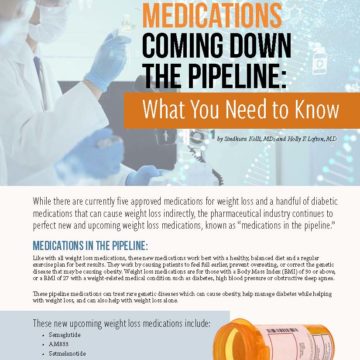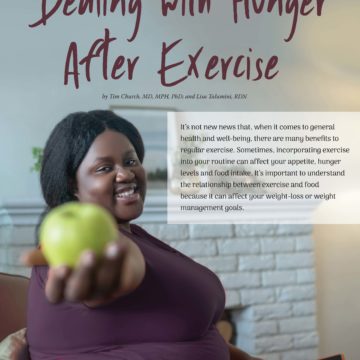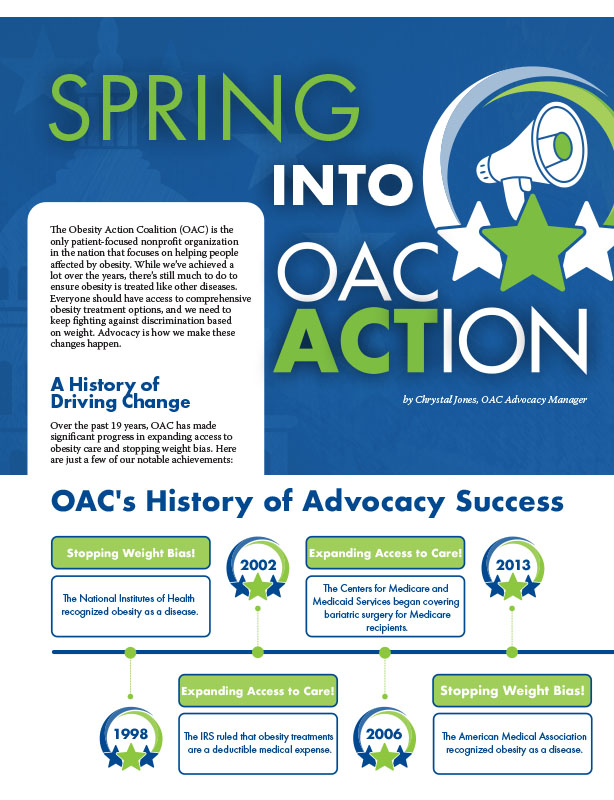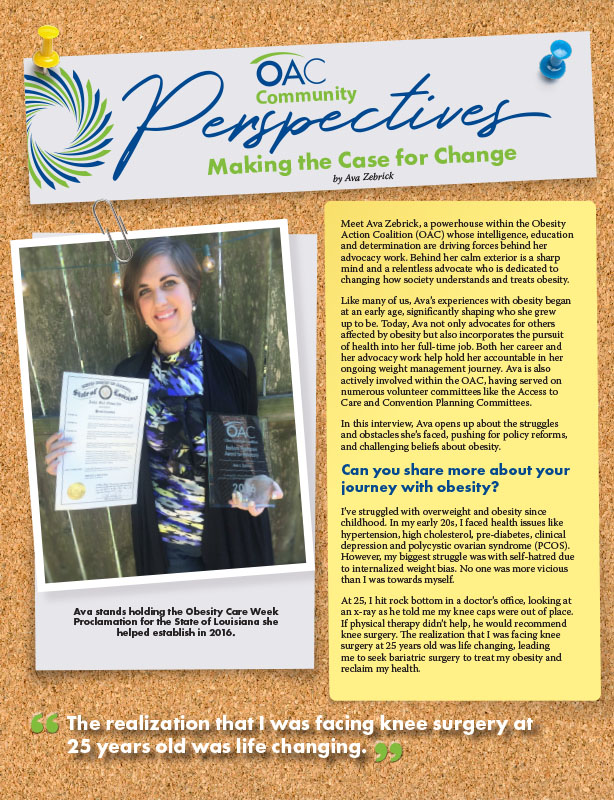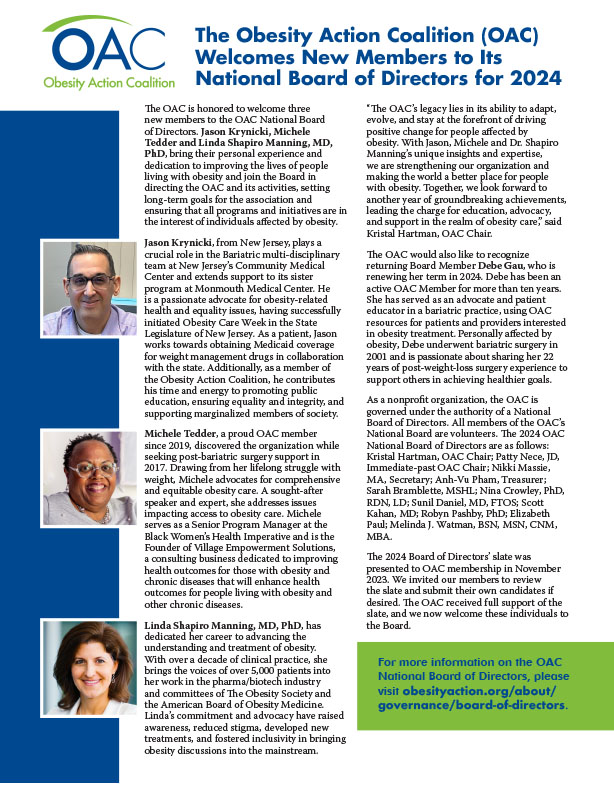What I’ve Learned as a Mom, Advocate, and Bariatric Surgeon

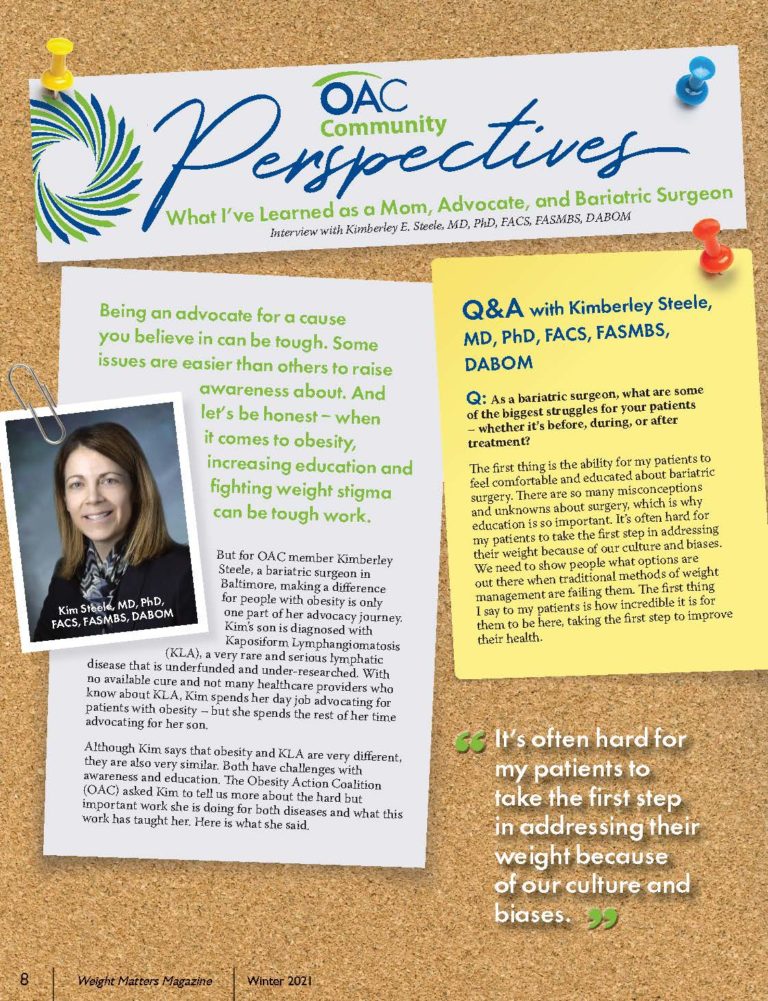
Interview with Kimberley E. Steele, MD, PhD, FACS, FASMBS, DABOM
Winter 2021
Being an advocate for a cause you believe in can be tough. Some issues are easier than others to raise awareness about. And let’s be honest – when it comes to obesity, increasing education and fighting weight stigma can be tough work.
But for OAC member Kimberley Steele, a bariatric surgeon in Baltimore, making a difference for people with obesity is only one part of her advocacy journey. Kim’s son is diagnosed with Kaposiform Lymphangiomatosis (KLA), a very rare and serious lymphatic disease that is underfunded and under-researched. With no available cure and not many healthcare providers who know about KLA, Kim spends her day job advocating for patients with obesity – but she spends the rest of her time advocating for her son.
Although Kim says that obesity and KLA are very different, they are also very similar. Both have challenges with awareness and education. The Obesity Action Coalition (OAC) asked Kim to tell us more about the hard but important work she is doing for both diseases and what this work has taught her. Here is what she said.
Q&A with Kimberley Steele, MD, PhD, FACS, FASMBS, DABOM
Q: As a bariatric surgeon, what are some of the biggest struggles for your patients – whether it’s before, during, or after treatment?
The first thing is the ability for my patients to feel comfortable and educated about bariatric surgery. There are so many misconceptions and unknowns about surgery, which is why education is so important. It’s often hard for my patients to take the first step in addressing their weight because of our culture and biases. We need to show people what options are out there when traditional methods of weight management are failing them. The first thing I say to my patients is how incredible it is for them to be here, taking the first step to improve their health.
There is also the problem of access to care. Many of my patients don’t have insurance coverage for bariatric surgery and that is really tough. In many cases, obesity hasn’t risen to the level of being widely recognized as a chronic disease, and that is reflected in a lot of insurance plans. It’s tough because as a bariatric surgeon, I know how effective surgery can be for treating obesity. This is a disease that affects multiple organs, and the evidence shows that it’s better to intervene sooner rather than later.
Another big challenge I often see in patients is navigating life after bariatric surgery. Bariatric surgeons operate on the stomach, not the brain. Many patients still struggle with their hunger and eating behaviors. Some struggle to understand that surgery is only a tool and that it’s hard work. After bariatric surgery, patients have to devote everything to adherence – taking the recommended vitamins and supplements, changing their lifestyle, and seeing their surgical team regularly for follow-up care.
Q: What are you doing in your own profession and in your community to increase obesity awareness, education, and support?
In my own practice, I am all about education! I love seeing a patient’s face light up when they “get it.” Education about obesity is paramount for seeing positive patient outcomes. I strive to provide education and resources for the whole process of my patients’ health journeys – not just bariatric surgery.
I also stress the importance of using your voice and advocating for your care. Navigating the healthcare system can feel daunting! I’ve had to do it on behalf of my son who has Kaposiform Lymphangiomatosis (KLA), a rare lymphatic disease that doesn’t get much funding or attention. With KLA, there are many challenges in awareness and treatment. This has impacted the way I practice medicine. I am a stronger advocate for navigating the healthcare system and providing support and resources to patients and their families.
Speaking up is crucial! Before I take anyone back to the operating room, I reiterate how important their voice is. If something doesn’t feel right or is making them uncomfortable, they need to speak up and let someone know.
Q: You’ve mentioned that advocating for your son, who has a different chronic disease from obesity, has taught you a lot about disease advocacy as a whole. What have you learned from your advocacy journey?
Obesity and my son’s disease, KLA, are very different – but they also have a lot in common. First, there’s this idea of disease recognition. The underlying causes of KLA are not well known, so it’s frustrating to see that there is not a lot of money being put toward research for my son but there is in other places. This has taught me how important it is to speak up and generate my own attention while asking others to join me.
I’ve also learned the importance of joining forces and riding on the coattails of others who have had success with disease advocacy. We can’t be sitting on an island or working in silos. We have to work together. Forming alliances with other networks and advocates can teach us new ways to educate, share our message and raise awareness.
Q: What are some of the misconceptions about obesity that you’ve come across in your advocacy and your work as a surgeon?
I’ve heard that obesity can be solved if you eat less and move more. That obesity is something you have total control over. It’s not! Obesity is a chronic disease – and like any disease, it can be tough to treat because there is currently no “cure.”
There is also the misconception that bariatric surgery is the easy way out. I can’t stress how untrue this is. Making the decision to have surgery, and then navigating life afterwards, is hard work. Bariatric surgery is a valuable tool but it’s not a cure. I am sad when others put pressure on patients to avoid surgery because they think it’s a copout. I believe patients who take this step are some of the strongest and bravest that I know.
Q: What do you think are some of the biggest barriers to increasing obesity education and fighting weight stigma? How do you think we can rise above them?
There is still a lack of understanding that obesity is a chronic disease. This affects not just whether treatments are used, but if they are made available and affordable by insurance companies. Knowing that treatments are out there and being able to access them is crucial when we know that early intervention is so important.
Weight stigma itself is also a huge barrier. Stigma exists everywhere in our environment. It starts early with kids and in our upbringing. We have to get rid of stigma in order to educate about obesity. We can’t be afraid to talk about obesity or else we will never change perceptions and provide options for treatment.
I think the solution starts with groups like OAC. It starts with education and speaking up. We have to share our stories and experiences so that together, we can amplify our voices and change how obesity is perceived.
Change Starts with Education
Kim’s story shows how important it is to be persistent and use your voice. Change takes time, but it starts with education and using your own experiences to enlighten others. Obesity can be a tough topic to talk about, but hard work pays off.
To hear more about Kim’s story and her son’s journey with KLA, which relies on advocacy, visit lgdalliance.org and check out their video at the bottom of the site.
Do You Want to Share Your Story?
Whether you have a story about navigating obesity, facing weight stigma, or inspiring others, your voice is important. Visit the OAC’s story project at WeightoftheWorld.com to share one today. Not sure what to say? Consider one of our question prompts to guide you.
If you would like your story to be featured in a future issue of Weight Matters Magazine, please email membership@obesityaction.org.
by Chrystal Jones, OAC Advocacy Manager Spring 2024 The Obesity Action Coalition (OAC) is the only patient-focused…
Read Articleby Ava Zebrick Spring 2024 Meet Ava Zebrick, a powerhouse within the Obesity Action Coalition (OAC) whose…
Read ArticleThe OAC is honored to welcome three new members to the OAC National Board of Directors. Jason Krynicki,…
Read Article




